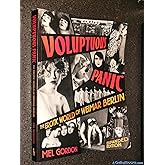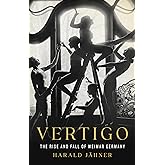
Enjoy fast, free delivery, exclusive deals, and award-winning movies & TV shows with Prime
Try Prime
and start saving today with fast, free delivery
Amazon Prime includes:
Fast, FREE Delivery is available to Prime members. To join, select "Try Amazon Prime and start saving today with Fast, FREE Delivery" below the Add to Cart button.
Amazon Prime members enjoy:- Cardmembers earn 5% Back at Amazon.com with a Prime Credit Card.
- Unlimited Free Two-Day Delivery
- Streaming of thousands of movies and TV shows with limited ads on Prime Video.
- A Kindle book to borrow for free each month - with no due dates
- Listen to over 2 million songs and hundreds of playlists
- Unlimited photo storage with anywhere access
Important: Your credit card will NOT be charged when you start your free trial or if you cancel during the trial period. If you're happy with Amazon Prime, do nothing. At the end of the free trial, your membership will automatically upgrade to a monthly membership.
Buy new:
$16.62$16.62
Ships from: Amazon.com Sold by: Amazon.com
Save with Used - Good
$9.87$9.87
Ships from: Amazon Sold by: eCampus_

Download the free Kindle app and start reading Kindle books instantly on your smartphone, tablet, or computer - no Kindle device required.
Read instantly on your browser with Kindle for Web.
Using your mobile phone camera - scan the code below and download the Kindle app.



 Audible sample
Audible sample Weimar Culture: The Outsider as Insider Reprint Edition
Purchase options and add-ons
A seminal work as melodious and haunting as the era it chronicles.
First published in 1968, Weimar Culture is one of the masterworks of Peter Gay's distinguished career. A study of German culture between the two wars, the book brilliantly traces the rise of the artistic, literary, and musical culture that bloomed ever so briefly in the 1920s amid the chaos of Germany's tenuous post-World War I democracy, and crashed violently in the wake of Hitler's rise to power. Despite the ephemeral nature of the Weimar democracy, the influence of its culture was profound and far-reaching, ushering in a modern sensibility in the arts that dominated Western culture for most of the twentieth century. Vivid and eminently readable, Weimar Culture is the finest introduction for the casual reader and historian alike.
16 black and white illustrations- ISBN-100393322394
- ISBN-13978-0393322392
- EditionReprint
- PublisherW. W. Norton & Company
- Publication dateDecember 17, 2001
- LanguageEnglish
- Dimensions5.6 x 0.7 x 8.3 inches
- Print length240 pages
Discover the latest buzz-worthy books, from mysteries and romance to humor and nonfiction. Explore more
Frequently bought together

Customers who viewed this item also viewed
Editorial Reviews
Review
― Walter Laqueur, New York Times Book Review
"A virtuoso performance, not the least because it has captured, with the greatest possible economy, a culture whose origin and essence were closely intertwined with its politics."
― Peter Jacobsohn, The New Republic
About the Author
Product details
- Publisher : W. W. Norton & Company; Reprint edition (December 17, 2001)
- Language : English
- Paperback : 240 pages
- ISBN-10 : 0393322394
- ISBN-13 : 978-0393322392
- Item Weight : 7.7 ounces
- Dimensions : 5.6 x 0.7 x 8.3 inches
- Best Sellers Rank: #750,929 in Books (See Top 100 in Books)
- #1,711 in German History (Books)
- #5,831 in Historical Study (Books)
- #19,770 in World History (Books)
- Customer Reviews:
About the author

Discover more of the author’s books, see similar authors, read book recommendations and more.
Customer reviews
Customer Reviews, including Product Star Ratings help customers to learn more about the product and decide whether it is the right product for them.
To calculate the overall star rating and percentage breakdown by star, we don’t use a simple average. Instead, our system considers things like how recent a review is and if the reviewer bought the item on Amazon. It also analyzed reviews to verify trustworthiness.
Learn more how customers reviews work on AmazonCustomers say
Customers find this book to be a classic monograph of cultural history, with one review noting how it immerses the reader in Weimar Germany's culture. The writing quality receives positive feedback, with customers describing it as expertly written.
AI-generated from the text of customer reviews
Select to learn more
Customers appreciate the book's historical content, with one describing it as a classic monograph and another noting how it immerses the reader in Weimar Germany's culture.
"...It has the clarity of research and of writing, the immediacy of history that keeps repeating itself, and all the warning signals that would help any..." Read more
"Fascinating insights into what gave rise to Weimar culture from a wide variety of perspectives: political, artistic, social, historical, significant..." Read more
"...His holistic approach to art, craft, politics, and culture completely immerses the reader in this period." Read more
"...There are better books on the culture of Berlin in the 1920s like Friedrich's [[ASIN:0060926791 Before the Deluge: A Portrait of Berlin in the 1920s]..." Read more
Customers praise the writing quality of the book, with one noting its concise style.
"...It has the clarity of research and of writing, the immediacy of history that keeps repeating itself, and all the warning signals that would help any..." Read more
"...More than other times and places, it nourished great writers, musicians, architects, film-makers, and painters, whose work has continued to delight..." Read more
"...the brief period of creativity and freedom between the World Wars, is concise, authoritative and as expertly crafted as one would expect from Peter..." Read more
"...unsurprisingly for a historian, more history that culture but decently written and quite broad in its perspective. A good entry into Weimar." Read more
Top reviews from the United States
There was a problem filtering reviews. Please reload the page.
- Reviewed in the United States on September 12, 2016The caveat here is you need to have a keen interest in Weimar. It helps If you've previously read Christopher Isherwood's Berlin Diary (the source of the play Cabaret). If the answer to both the above is yes, and if you are also interested in what happens when a wealthy country is stripped bare by war and reparations thereafter, then this book is a must. It has the clarity of research and of writing, the immediacy of history that keeps repeating itself, and all the warning signals that would help any society of learned folk understand the need to make 'never again' meaningful instead of just a sometime slogan.
- Reviewed in the United States on August 25, 2008Peter Gay's elegant tale takes up an old theme, the connection between culture and politics, that recalls ancient Greek debate about art and society. Artists and politicians, outsiders and insiders, have much in common. Weimar deserves a close look for two reasons. More than other times and places, it nourished great writers, musicians, architects, film-makers, and painters, whose work has continued to delight and inform. Also, it was a time of political upset, a Prussian-styled monarchy, deposed after the humiliation of World War I, gave way to a creative social-democratic government that wilted during the great depression, and foreshadowed the rise of fascism and World War II.
Gay puts forward the idea that culture is " in continuous, tense interaction with society, and expression and criticism of political realities. This mixture of intimacy and hostility between art and life is characteristic of all modern society." Political extremism provokes crisis and a reaction, that in turn may be followed by extreme counter-reaction. Blood will have blood. Feeding on and fueling the political turmoil, culture flourishes. The idea of culture existing outside of politics is a delusion. Weimar showed that there were two connected Germanies: "the Germany of military swagger ... and the Germany of lyrical poetry."
In a small way the book itself illustrates the point. It was first published in 1968, as the war in Vietnam boiled over, and the U.S. turned from an era of expanding democracy under Johnson to right-wing conservatism under Nixon. When it was republished in 2001, fortunes evaporated as the the dot-com stock-market imploded, terrorists rained down war on U.S. soil, and government again turned sharply from an expansive democracy under Clinton to reactionary conservatism under Bush. What could be more timely than a beautifully written book that links cultural flowering to poltical confusion?
In six brief chapters Peter Gay uses Freudian images to trace the birth, growth, and death of the Weimar Republic. He describes the November 1918 revolution after Germany's defeat in World War I, and the establishment of the Republic at Weimar as a "revolt of the sons." Of course, Weimar's expressionist culture had roots that stretched before 1918. But it flourished abundantly during the Republic. Without a single message, Weimar had a unifying theme: the pursuit of a renewed, peaceful humanity, the "son's revolt against the father ... a bid for rational freedom against irrational authority."
Weimar's artistic contempt for politics and longing for renewal ironically furthered the Nazi cause. Ironically, because the Nazis despised expressionist culture. Rainer Maria Rilke, in calling for a universe in which love and suffering, life and death, form a harmonious whole, "in calling for something higher than politics, helped to pave the way for something lower - barbarism." Martin Heidegger, a most subtle philosopher-poet and benighted Nazi sympathizer, found reason and intellect to be inadequate guides to the secret of being. Thomas Mann proudly proclaimed himself to be unpolitical. Gay calls these feelings a "hunger for wholeness," defined by the pursuit of culture for its own sake, a strong need for community, the dismissal of reason, the yearning for heroes, and unquestioning submission to authority.
Counter-revolution follows revolution and in Gay's Freudian model the "revenge of the father" comes after the "revolt of the sons." Following the social-democratic revolution in 1918, art and politics were in a time of innovation. Between 1924 and 1929 there was prosperity and stability. The arts displayed a new, matter-of-fact, objectivity. In 1924 a wiser Thomas Mann, now seeing connections between politics and life, published "The Magic Mountain."
Berlin became a cultural center with a lively theater scene (Brecht), film (The Cabinet of Dr. Caligari), music (Furtwangler, Walter), architecture (Gropius' Bauhaus school of architecture), and journalism. The excitement, celebration, sexual freedom, and hustle of Berlin led some to describe it as dancing at the edge of a volcano. If there was hedonism, there was much else of enduring value.
After 1929 unemployment rose, the economy sank, the newspapers overflowed with right-wing propaganda, and "the country was inundated by the rising tide of Kitsch, much of it politically inspired." Nazis led riots against Remarque's film, "All Quiet on the Western Front." Brecht's "Threepenny Opera" taunted the choice of the middle class for a full belly over morality. In a fit of black humor Gay notes, "There was a whole genre of novels dealing with the suicides of young high school students ... and its popularity reflected widespread interest in a grave phenomenon." By 1933 the expressionist artists dispersed and the Nazis began to labor in earnest.
"Weimar Culture" provides a useful introduction to German Kultur und Politik between 1918 and 1933. More important, the book persuasively illustrates a model for understanding how they interact. Political tides influence art, and art colors politics.
- Reviewed in the United States on September 2, 2017Fascinating insights into what gave rise to Weimar culture from a wide variety of perspectives: political, artistic, social, historical, significant individuals' influence, and underlying trends that laid the foundation for what was coming next. It is not deterministic, but instead indicates what could have been, and lost opportunities. Which makes those years feel like a tragedy - something that did not have to happen, but did due to inability of various leaders, parties and institutions to escape from the history that preceded it. The consequences of disaffected war veterans turning to violence, laying the foundation for Nazis to use that violence as a necessary precursor for usurping political processes was particularly unnerving. Was Weimar doomed from the start? Most likely. But not inevitable. The book would have benefited from more translation of German terms and quotes.
- Reviewed in the United States on July 17, 2021Peter Gay brings the entire culture of the period to life, as only he can do. His holistic approach to art, craft, politics, and culture completely immerses the reader in this period.
- Reviewed in the United States on July 27, 2017Known for his works on Freud, this reprint (which could be better printed) of the definitive history of the brief period of creativity and freedom between the World Wars, is concise, authoritative and as expertly crafted as one would expect from Peter Gay.
- Reviewed in the United States on April 7, 2018Read the book when it first appeared and found it extraordinary in its vivid description of the milieu of the time. I purchased this copy for a friend.
- Reviewed in the United States on September 26, 2017In this interesting analysis of the culture of Weimar Germany, Gay posits the idea that the outsiders of Wilhelmine Germany became the insiders of Weimar Germany. However he never is able to explain how this happened. In fact he states that the cultural trends that flowered in Weimar were already beginning during the pre-WWI Wilhelmine period. Gay states he wants to define the Weimar spirit but I don't think he ever does. What we have instead is a snapshot of the people and culture of Weimar Berlin. And it is Berlin that he mostly focuses on because Berlin was the largest city and capital of the Republic.
In a few chapters Gay focuses on on the birth of Weimar (though sadly he doesnt give a political history of the Republic until the end of the book), on its cultural output by focusing on literature, philosophy, music, newspapers, opera, painting, and that most modern of mediums - movies. As an aside, Gay's criticisms of the Fritz Lang movie 'Metropolis' was seriously misguided. I wonder how he came to his views and wish he had engaged with most of the laudatory reviews of the movie. Still, this book was written over fifty years ago and everyone is entitled to their opinions.
Ultimately the book fails to prove anything. But it offers a good snapshot of Berlin between 1919 and 1933. There are better books on the culture of Berlin in the 1920s like Friedrich's Before the Deluge: A Portrait of Berlin in the 1920s. Also, I'd read a history of Weimar Berlin first to understand the politics and economics of the period.
- Reviewed in the United States on August 9, 2017Yes , the book more than net my expectations. But I'm much too old to write a review.! So also for the McElygoot book of which so far I have read about half. The other two I haven't yet opened
Top reviews from other countries
-
 Arthur IsaacReviewed in the Netherlands on December 21, 2016
Arthur IsaacReviewed in the Netherlands on December 21, 20165.0 out of 5 stars Weimar door W. Lacqeur
prachtige beschrijving van politieke en culturele gebeurtenissen in Duitsland in de jaren 20 en begin dertig van de vorige eeuw
 L. J. NicholsonReviewed in the United Kingdom on August 27, 2014
L. J. NicholsonReviewed in the United Kingdom on August 27, 20145.0 out of 5 stars Weimar laid bare
Peter Gay's book is essential reading if you are interested in the period between wars in Germany. Well written and researched.
 Atilla ATLIReviewed in the United Kingdom on April 21, 2016
Atilla ATLIReviewed in the United Kingdom on April 21, 20165.0 out of 5 stars Five Stars
Fully satisfied.
 Dr. R. BrandonReviewed in the United Kingdom on March 7, 2017
Dr. R. BrandonReviewed in the United Kingdom on March 7, 20173.0 out of 5 stars A Dense, At Times, Difficult Book
I realise that this will put me at odds with other reviewers and the quoted press reviews but I frankly found this rather dense book disappointing. Perhaps the 1960s presentation style is now dated. Before considering the text let me say that the design of the book is misleading. A nude lady appears on the cover so you may think the subject of Weimar cabaret will appear in the book, not so. I can see no justification for this cover design. The printed illustrations are of low quality and not very relevant to the text.
Turning to the content the author, Peter Gay, has chosen to adopt a psychological context for the different chapters. He is trying to demonstrate his thesis of deep underlying psychological fault lines in the German psyche following the defeat of the First World War and the founding of the Weimar Republic on 9th November 1918. In so doing the author attempts to describe the different aspects of Weimar culture in support of his hypothesis. I would have much preferred a straightforward exposition of German cultural trends in the 1920s and 30s free of this overlay of Freudian ideas.
After an introduction to the history of the Weimar Republic there follows five chapters, each deals with a different aspect of the culture. Thus, ‘Community of Reason’ describes the founding of important institutes outside the established universities, including the esteemed Warburg Library and Institute. The key cultural change here being that the institutes admitted students without the need for the ‘Abitur’ which was previously a necessity for entry to higher education. The chapter ‘Secret Germany – Poetry as Power’ deals with the unprecedented influence of poets such as Stefan George, Rainer Maria Rilke and the 18th century Holderlin. The playwright Buchner who wrote ‘Danton’s Death’ and ‘Woyzek’, later to become Alban Berg’s opera ‘Wozzeck’ in 1925 using Schonberg’s 12-tone system and ‘Sprechgesang’, is discussed at length. ‘The Hunger for Wholeness – Trials of Modernity’ is a somewhat difficult chapter on the philosopher Heidegger and the supposed superiority of German culture. This feeling, it is suggested, resulted in the formation of ‘Wandervogel’, community groups for the promotion of outdoor activities and folk culture. Oddly the architects Erich Mendelsohn and Walter Gropius are also mentioned in this chapter but knowledge of their work by the reader is assumed, not described. Expressionist film, in particular Robert Wiene’s 1920, ‘The Cabinet of Dr Caligari’ and the revolutionary Expressionist artists such as Grosz, Dix and Beckmann are mentioned in ‘The Revolt of the Son – The Expressionist Years’ (1918 – 1924). However, again the author assumes knowledge by the reader of the work of these artists and their output is not described or illustrated. Finally ‘The Revenge of the Father’ charts the return to artistic objectivity and sobriety during the years 1924 to 1929, the rise of ‘Neue Sachlichkeit’. Thomas Mann’s 1924 book, ‘Der Zauberburg’ (The Magic Mountain) is discussed at length. The main publishing houses operating in Germany at this time are also referred to with Ullstein Verlag coming in for much criticism. I think you have to be a little wary of an author who describes ‘Grand Hotel’ and other books by Vicki Baum as “facile mediocraties” and Fritz Lang’s ‘Metropolis’ as a “tasteless extravaganza”.
As will be evident from the comments above that the author does not discuss the most obvious subjects such as architecture, art, theatre, cabaret or the most popular writers of the day in any useful detail, for this you will need to turn elsewhere. Gay’s writing is about feelings and psychology and I doubt many citizens of the Republic would have recognised his exposition of their culture.
A useful short synopsis of the political history of the Weimar Republic appears as an appendix.
 Diane JamesReviewed in the United Kingdom on August 11, 2015
Diane JamesReviewed in the United Kingdom on August 11, 20155.0 out of 5 stars Five Stars
excellent ;)















